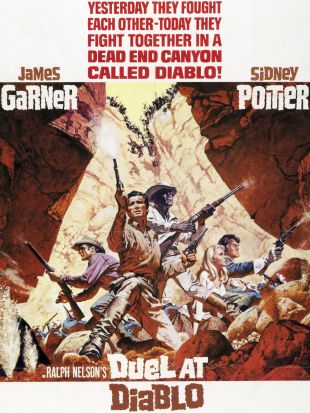Ralph Nelson's Duel At Diablo (1966) is, in some respects, almost a dry-run for his much more pessimistic and even more violent Soldier Blue (1970) -- while the latter was permeated with a bitterness and brutality that was the product of five years of slaughter in Vietnam, Duel At Diablo was more rooted in the sensibilities surrounding the struggle over civil rights, which was contemporaneous with its production. The movie's points about the impossible racial tensions cutting across American society and, indeed, across the continent, give it a bleak and searing topical edge that hasn't lost all of its relevancy over the ensuing four decades. There are also some wonderful little details in the depiction of the time and setting, such as in the Bibi Andersson character's first contact with James Garner's frontier scout -- she can't see who he is, but assumes he is one of her pursuers, and addresses him in Apache; he has to point out, in English and to her astonishment, that he isn't Apache. In details like that, and its overall story arc, however, the movie may have been almost too far ahead of the sensibilities of the era for its own good -- Sidney Poitier's boldness in the part of a soldier-turned-gambler was something new in mainstream westerns, and the casting of Dennis Weaver totally against type, in the role of a racist and murderer who is considered an upstanding citizen of the town, stretched the tolerance of audiences in 1966 almost to the breaking point (it should be remembered that even a figure such as Johnny Cash was branded as a political traitor in mainstream country music circles for showing his sympathy for Native Americans and the poor too overtly). The movie's lack of any answers also made it too honest and bleak for its time, though by the end of the decade it would have been totally in synch with what audiences were thinking might be the tragic truth -- and by then, Nelson had pushed the envelope even further with Soldier Blue.

Duel at Diablo (1966)
Directed by Ralph Nelson
Genres - Western |
Sub-Genres - Cavalry Film |
Release Date - Jun 15, 1966 (USA - Unknown), Jun 15, 1966 (USA) |
Run Time - 103 min. |
Countries - United States |
MPAA Rating - NR
Share on